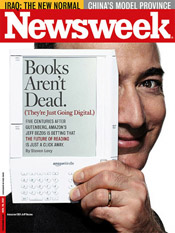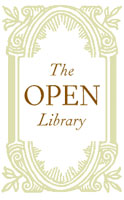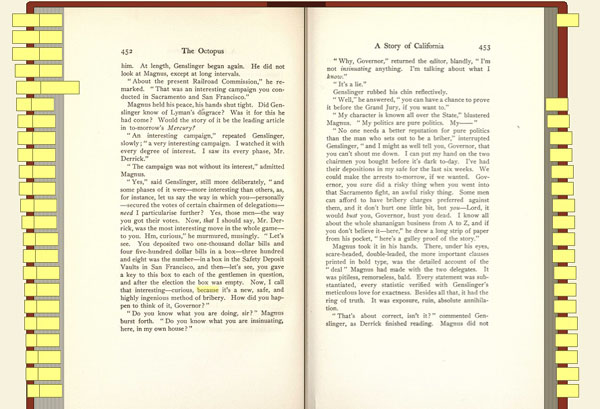The NY Times reported yesterday that the Kindle, Amazon’s much speculated-about e-book reading device, is due out next month. No one’s seen it yet and Amazon has been tight-lipped about specs, but it presumably has an e-ink screen, a small keyboard and scroll wheel, and most significantly, wireless connectivity. This of course means that Amazon will have a direct pipeline between its store and its device, giving readers access an electronic library (and the Web) while on the go. If they’d just come down a bit on the price (the Times says it’ll run between four and five hundred bucks), I can actually see this gaining more traction than past e-book devices, though I’m still not convinced by the idea of a dedicated book reader, especially when smart phones are edging ever closer toward being a credible reading environment. A big part of the problem with e-readers to date has been the missing internet connection and the lack of a good store. The wireless capability of the Kindle, coupled with a greater range of digital titles (not to mention news and blog feeds and other Web content) and the sophisticated browsing mechanisms of the Amazon library could add up to the first more-than-abortive entry into the e-book business. But it still strikes me as transitional – ?a red herring in the larger plot.
A big minus is that the Kindle uses a proprietary file format (based on Mobipocket), meaning that readers get locked into the Amazon system, much as iPod users got shackled to iTunes (before they started moving away from DRM). Of course this means that folks who bought the cheaper (and from what I can tell, inferior) Sony Reader won’t be able to read Amazon e-books.
But blech… enough about ebook readers. The Times also reports (though does little to differentiate between the two rather dissimilar bits of news) on Google’s plans to begin selling full online access to certain titles in Book Search. Works scanned from library collections, still the bone of contention in two major lawsuits, won’t be included here. Only titles formally sanctioned through publisher deals. The implications here are rather different from the Amazon news since Google has no disclosed plans for developing its own reading hardware. The online access model seems to be geared more as a reference and research tool -? a powerful supplement to print reading.
But project forward a few years… this could develop into a huge money-maker for Google: paid access (licensed through publishers) not only on a per-title basis, but to the whole collection – ?all the world’s books. Royalties could be distributed from subscription revenues in proportion to access. Each time a book is opened, a penny could drop in the cup of that publisher or author. By then a good reading device will almost certainly exist (more likely a next generation iPhone than a Kindle) and people may actually be reading books through this system, directly on the network. Google and Amazon will then in effect be the digital infrastructure for the publishing industry, perhaps even taking on what remains of the print market through on-demand services purveyed through their digital stores. What will publishers then be? Disembodied imprints, free-floating editorial organs, publicity directors…?
Recent attempts to develop their identities online through their own websites seem hopelessly misguided. A publisher’s website is like their office building. Unless you have some direct stake in the industry, there’s little reason to bother know where it is. Readers are interested in books not publishers. They go to a bookseller, on foot or online, and they certainly don’t browse by publisher. Who really pays attention to who publishes the books they read anyway, especially in this corporatized era where the difference between imprints is increasingly cosmetic, like the range of brands, from dish soap to potato chips, under Proctor & Gamble’s aegis? The digital storefront model needs serious rethinking.
The future of distribution channels (Googlezon) is ultimately less interesting than this last question of identity. How will today’s publishers establish and maintain their authority as filterers and curators of the electronic word? Will they learn how to develop and nurture literate communities on the social Web? Will they be able to carry their distinguished imprints into a new terrain that operates under entirely different rules? So far, the legacy publishers have proved unable to grasp the way these things work in the new network culture and in the long run this could mean their downfall as nascent online communities (blog networks, webzines, political groups, activist networks, research portals, social media sites, list-servers, libraries, art collectives) emerge as the new imprints: publishing, filtering and linking in various forms and time signatures (books being only one) to highly activated, focused readerships.
The prospect of atomization here (a million publishing tribes and sub-tribes) is no doubt troubling, but the thought of renewed diversity in publishing after decades of shrinking horizons through corporate consolidation is just as, if not more, exciting. But the question of a mass audience does linger, and perhaps this is how certain of today’s publishers will survive, as the purveyors of mass market fare. But with digital distribution and print on demand, the economies of scale rationale for big publishers’ existence takes a big hit, and with self-publishing services like Amazon CreateSpace and Lulu.com, and the emergence of more accessible authoring tools like Sophie (still a ways away, but coming along), traditional publishers’ services (designing, packaging, distributing) are suddenly less special. What will really be important in a chaotic jumble of niche publishers are the critics, filterers and the context-generating communities that reliably draw attention to the things of value and link them meaningfully to the rest of the network. These can be big companies or light-weight garage operations that work on the back of third-party infrastructure like Google, Amazon, YouTube or whatever else. These will be the new publishers, or perhaps its more accurate to say, since publishing is now so trivial an act, the new editors.
Of course social filtering and tastemaking is what’s been happening on the Web for years, but over time it could actually supplant the publishing establishment as we currently know it, and not just the distribution channels, but the real heart of things: the imprimaturs, the filtering, the building of community. And I would guess that even as the digital business models sort themselves out (and it’s worth keeping an eye on interesting experiments like Content Syndicate, covered here yesterday, and on subscription and ad-based models), that there will be a great deal of free content flying around, publishers having finally come to realize (or having gone extinct with their old conceits) that controlling content is a lost cause and out of synch with the way info naturally circulates on the net. Increasingly it will be the filtering, curating, archiving, linking, commenting and community-building -? in other words, the network around the content -? that will be the thing of value. Expect Amazon and Google (Google, btw, having recently rolled out a bunch of impressive new social tools for Book Search, about which more soon) to move into this area in a big way.

 Steven Levy’s Newsweek cover story,
Steven Levy’s Newsweek cover story, 
 A little while back I was musing on the possibility of a
A little while back I was musing on the possibility of a 